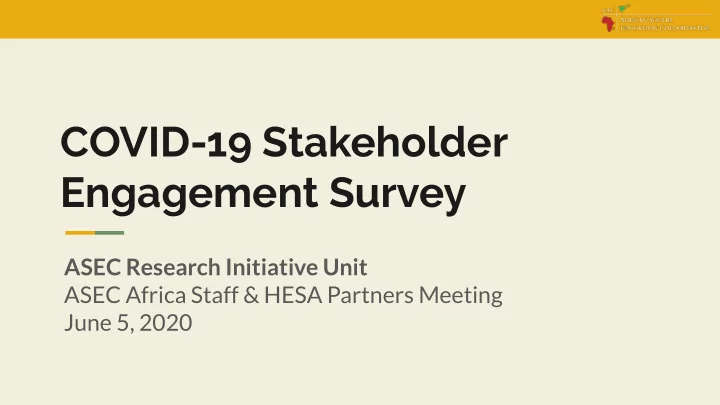

COVID-19 Stakeholder Engagement Survey ASEC Research Initiative Unit ASEC Africa Staff & HESA Partners Meeting June 5, 2020
Purpose ● To seek an organizational understanding of ASEC stakeholders’ experiences and coping mechanisms during the global COVID-19 pandemic ● To provide a proactive response at an organizational level
Significance During the COVID-19 pandemic: ● Assess status of stakeholders ● Prioritize stakeholder needs ● Inform ASEC operations
Survey Design & Methodology
Methodology Quantitative Focus (1 Qualitative Question) Large Participant Pool ( ≅ 3,800) Response Rate 40% ( N =1,529) ASEC US & Africa Staff ● HESA Partner Representatives ● SLDI Partner Representatives ● National Conference Representatives ● SLDI, HESA, Scholarship, Service Learning, & ● Visiting Scholar Participants Delivered via Email & WhatsApp- Survey Monkey
Survey Design Data Permission Statement Confidentiality/Informed consent 24 Total Questions 8 Demographic ● 15 Assessing COVID-19 ● Impact 1 Short Answer ●
Participant Demographic Overview
Participants The majority of participants classified themselves as religious ( n =1,460). A total of 1,529 participants submitted responses to the survey 34 declined to complete ● due to data permission concerns
Country of Residence Country N % Country N % Kenya 320 23% Cameroon 85 6% Tanzania 257 18% Malawi 85 6% Nigeria 191 13% Other 32 2% Uganda 178 13% Lesotho 21 1% Ghana 131 9% United States 17 1% Zambia 98 7% South Sudan 2 .14% ( n =1,417)
Current ASEC Relationship The majority of respondents indicated they were ASEC Program Participants ( n =1,418).
ASEC Program Participants Amongst respondents who indicated they were ASEC program participants 49% selected HESA and 49% selected SLDI ( n =1,344)
Participant Professions The largest number of respondents indicated that they were currently students ( n =1,405).
Findings
Mean Age ( M = 40.74, SD =9.60) Quantitative Min. 23; Max. 79 Results Years of Service ( M =10.40, SD =8.86) Min 1 Month; Max. 47 Years
Ministry/Work Related Results
Coping Skills Results
Emotional Experience Results
Personality Type Results The largest number of survey respondents indicated that they were extroverts ( n = 1,217).
Results on the Hypothesis Testing. 1. H o : In crisis management, there is no significant relationship between personality type (extrovert/introvert) and disposition to the impact on stakeholders’ ministries/work, emotional experiences, and coping skills. 2. Additional Outcome: There was no relationship between emotional impact and whether one was a religious or lay.
Greatest Support During COVID-19 Pandemic The most common greatest source of support for participants was personal prayer ( N =1,222).
Qualitative Results In your opinion, how can ASEC best support you and your institution/ organization during the COVID-19 pandemic?
Support Themes Overview ( N =1,529) Theme % 1. Material Support 31% 2. Additional Skills Training 23% 3. Financial Support 15% 4. Prayer & Spiritual Support 14% 5. Continue Offering ASEC Programs 7% 6. Encouragement & Moral Support 5% 7. Increased Communication 5%
Support Priorities & ASEC Relationship ASEC Relationship Priority Area Partner Institution Representatives Material Support National Conference Representatives Material Support HESA Liaisons Material Support ASEC Program Participants Material Support ASEC Staff Increase Communication
Material Support Getting data for knowing what is happening around you is a problem. We were given some course works to do Medical Supplies during this pandemic but because of lack PPE, Sanitizer/Soap, of data, we are unable to do...affording Thermometers, Ventilators data is still not easy because of the nature of the communities we are ICT Supplies coming from. Data Bundles, Laptops -Uganda, HESA Participant Especially where I live, lot of people can not provide food, people are suffering, Food Supplies and dying. Hungry are killing people, because they can not provide for their daily basic food, due to lock down. -Cameroon, HESA Participant
Additional Skills Training I think if we can be trained in order to cope with this new reality, so as to help those in Mental Health danger, it can be helpful. Coping Skills, Counseling -Cameroon, SLDI Participant COVID-19 Provide us with authentic Prevention, Symptoms, Treatment information about the virus since we have lots of Crisis Management information on the media, and Disaster Relief, Risk Assessment also some logistics in case we have cases. Common Suggestions: -Ghana, HESA Participant Online & Printed Materials
Financial Support “ I request ASEC to support me financially. Because for these two month all our workers haven't got their salaries due to the temporary close of the schools because of COVID-19 pandemic. As headteacher am worried because of their families and I have no way to assist them. -Tanzania, SLDI Participant
Prayer & Spiritual Support “ASEC can support me by joining with me in the networking prayers for God's intervention to heal and to save his people.” -Nigeria, SLDI & HESA Participant
Increase Communication Provide the needed logistics for my work as an Instructor on the SLDI Facilitate Sharing program. Information on Online Forums developments that will improve the quality of work. -SLDI Facilitator Continuous Updates By keeping strongly in touch with all Newsletter, Emails country coordinators who will in turn keep links with all religious in their countries. Social Media -Visiting Scholar COVID-19 Info, Updates
Conclusion Limitations, & Recommendations Image sourced online.
Limitations of the Study ● Pandemics whether national/ regional/ global crisis do not always warn ahead of time, no known research tool was readily available to match the needs of this study ● Results are limited to this organizational study. ● Self-reported scores are mostly subjective and could change tomorrow ● Participants were disproportional at only 3% for the lay
Conclusions Although Work/ministries ● had major negative impact, ASEC enjoys a strong team of ● stakeholders, high coping skills & emotional balance. ASEC engages in best ● practices from a grounds-up approach with partners. ASEC has a proactive role in ● stakeholders’ engagement. Networking and outsourcing. ●
Future Research ● Conduct a post-COVID 19 survey ● Replicate this study with more lay staff from across the ministries of women religious ● Conduct an in-depth case study with major superiors within ASEC’s network
Questions & Comments Thank you!
Recommend
More recommend